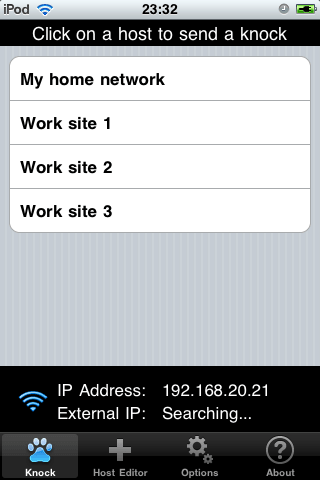Quick Access

For busy IT professionals
Use Case
This app is ideal if you're on a WiFi network but don't have a port knocker on the available computers.
If you're sitting behind a NAT, the iPhone® or iPod touch® will have the same public IP as any of the other computers on your network.
This is also great to use with TouchTerm or any other ssh or telnet software for the iPhone. Just give it the hostname and a list of ports, and whether you want it to send TCP or UDP packets.
Features
- Unlimited Configuration
Specify as many packets per host and as many hosts as you want.
- Enhanced Protocol Selection
Mix and match UDP or TCP packets for any knock sequence.
- Configurable Network Interface
You choose whether to send knocks via WiFi or your carrier (eg. LTE/Edge).
- External IP
You can easily verify your configuration and security by seeing the IP address knocks will be delivered from.
- Password Protection
Share your device with others? No problem, add a password lock to the app. You can also view logs to see when the attempt happened.
- Knock Validation
Opening a TCP service? Now you can specify a port to validate so you can be sure your knock went through.
- AutoApp Launch
Launch Web, Mail, or SSH after a successful knock.
(Note: You'll need to have a compatible SSH app installed on your iOS device to use the SSH launch feature).
- Import/Export
Backup or edit your configurations using the simple import/export feature. The output format is in XML plist format.
- Configurable InterPacket Delay
Routers and networks may deliver packets out of order. The configurable inter-packet delay allows you to compensate.
Brief Description of Port Knocking for the Layman
Port Knocking is a technique to secure services behind a firewall until a specific knock sequence is given. This is not to be confused with port scanning (a network management tool for discovering open services on a system).
Imagine you left your kids at home alone. You don't want them to open the door for str angers. And when a stranger comes knocking, you don't even want them to come to the do or, because you don't want them to know your kids are there.
But, when you or other family members come, you might want them to open the door for you. So you teach them to listen for a certain rattat-tat-tat or special knock that only you and your family know.
This is the same concept you can apply to your servers. If you run a knock daemon on your server, this app then lets you send the special knock to it.